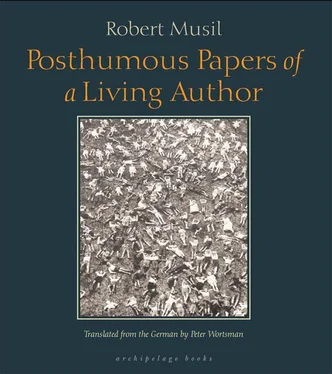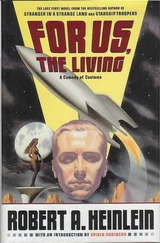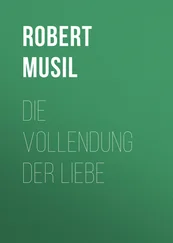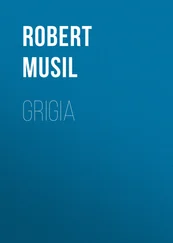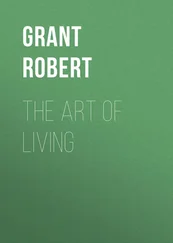Then the hare politely raised himself upright and said: “Gentlemen, if you can’t decide the matter among yourselves, then I’ll take the liberty of still being alive! For I fell, as I now realize, from the mere shock of it.”
Then Mr. Hiff and Mr. Haff were, as we say, all in a huff, which in the case of Mr. Huff naturally goes without saying. But the hare proceeded unperturbed. He regarded them with big, hysterical eyes — probably, after all, because death has grazed his hide — and began to tell the hunters their fortunes. “Gentlemen, I can prophecy your end,” he said, “if only you let me live! You, Mr. Hiff, will in as soon as seven years and three months be mowed down by death in the form of a bull’s horns; and Mr. Haff will grow very old, but I see an awfully grisly end for you — something — well, it isn’t so easy to talk about.” He paused and regarded Haff with a look of concern, then snapped out of it and rattled quickly: “But Mr. Huff will choke on a peach pit, that’s simple.”
Then the hunters turned pale, and the wind howled over this lonely place. But as the gun barrels still rattled in the wind against their legs, their fingers loaded up their guns again, and they said: “How can you know what hasn’t happened yet, you liar!”
“The bull that is supposed to spear me in seven years,” said Mr. Hiff, “isn’t even born yet; how can he spear me if he may never be born!?”
And Mr. Huff consoled himself in this way, saying: “All I have to do is not eat any more peaches, and already you’re a swindler!”
But Mr. Haff just said: “Well, well!”
The hare replied: “You gentlemen can make of this what you will; it won’t do you any good.”
Then the hunters made ready to trample the hare to death with their boots, and yelled: “No hare is going to make us superstitious!!” But in that instant an ugly old hag came walking by, carrying a load of kindling, and the hunters had to spit three times quickly so as to ward off the evil eye.
Then the hag, who had noticed what they’d done, grew angry and cried back: “Yas tink I couldn’ toin der heads in de old days!” No one could say for sure where her accent was from; but it sounded an awful lot like the dialect of Hell.
The hare took advantage of this opportunity to escape.
The hunters thundered after him with their rifles, but the hare was no more to be seen, and the old hag had also disappeared, though they thought they heard a wild cackle above the sound of the three shots.
Then Mr. Haff wiped the sweat off his brow and shivered.
Mr. Hiff said: “Let’s go home.”
And Mr. Huff was already bounding up the hill.
When they got to the stone cross up on the top of the hill though, they felt safe in its proximity and took a rest.
“We made fools of ourselves,” said Mr. Huff, “— it was an absolutely ordinary hare.”
“But he spoke to us —” said Mr. Haff.
“That can only have been the wind, or the blood climbing to our ears,” Mr. Hiff and Mr. Huff explained.
Then God whispered down from the stone cross: “Thou shalt not kill. .!”
The three were once again struck with terror and stepped back a good twenty steps from the stone cross; things are bad when you can’t even feel safe here! And before they could say another word, they found themselves bounding home with giant steps. It was only after the familiar smoke of their rooftops curled round the bushes, and the village dogs barked and children’s voices shot through the air like the chirp of sparrows that their legs stopped shaking. They stood still on them, feeling warm and safe. “Everybody’s got to die of something,” sighed Mr. Haff, who according to the hare’s prophecy had the longest to live; he knew damn well why he’d said what he said, though all of a sudden he grew troubled by the suspicion that his pals might also know why, and he was ashamed to ask them.
But Mr. Hiff replied in kind: “If I weren’t allowed to kill, well then I wouldn’t be allowed to be killed either, would I? Ergo, I say, there’s a fundamental contradiction here!” Each might apply this as he saw fit, a sensible answer it was not, and Mr. Hiff chuckled philosophically, so as to hide the fact that he was dying to know if the others had understood him all the same, or if something wasn’t right in his head.
Mr. Huff, the third one, pensively trampled an earthworm underfoot and replied: “We don’t only kill animals, we also protect them and preserve order in the field.”
Then everyone knew that the others knew too; and while everyone secretly remembered it, the experience already began to fade like a dream after waking, for what three men heard and saw cannot be a secret and thereafter not a miracle either, but must at best be a delusion. And all three suddenly sighed: Thank God! Mr. Hiff sighted it over his left boot toe, Mr. Huff over his right, for both squinted back at God in the field, whom they secretly thanked for not having actually appeared in person; but since the two others looked aside, Mr. Haff could turn himself all the way around to the cross, twitch his ears, and say: “We drank brandy on an empty stomach today, a hunter shouldn’t ever do that.”
“That’s it!” all three agreed, sang a merry hunter’s song about green woods and fields, and tossed stones at a cat that had surreptitiously slipped into the field to hunt hare eggs; for now the hunters were no longer afraid of the hare. But this last part of the story may not be quite as authentic as the rest, for there are people who claim that hares lay eggs on Easter.
The Blackbird
The two men whom I must mention in order to relate three little stories, in which the narrative pivots around the identity of the narrator, were friends from youth; let’s call them Aone and Atwo. The fact is that such early friendships grow ever more astounding the older you get. You change over the years, from the crown of your head to the soles of your feet, from the skin’s soft down to the depths of your heart, but strangely enough, your relationship with each other stays the same, fluctuating about as little as the communion we each carry on with that diverse host of sirs successively addressed as I . It is beside the point whether or not you still identify with that little blond numbskull photographed once long ago; as a matter of fact, you can’t really say for sure that you even like the little devil, that bundle of I. And so too, you may very well both disagree with and disapprove of your best friends; indeed, there are many friends who can’t stand each other. And in a certain sense, those friendships are the deepest and the best, for without any admixtures, they contain that indefinable essence in its purest form.
The youth that united the two friends Aone and Atwo was nothing less than religious in character. While both were brought up in an institution that prided itself on the proper emphasis it placed on the religious fundamentals, the pupils of that institution did their best to ignore those selfsame principles. The school chapel, for instance, was a real, big, beautiful church, complete with a stone steeple; it was reserved for the school’s exclusive use. The absence of strangers proved a great boon, for while the bulk of the student body was busy according to the dictates of sacred custom, now kneeling, now rising at the pews up front, small groups could gather at the rear to play cards beside the confessional booths, or to smoke on the organ steps. And some escaped up to the steeple, whose pointed spire was ringed by a saucer-like balcony on the stone parapet of which, at a dizzying height, acrobatics were performed that could easily have cost the lives of far less sin-burdened boys than these.
Читать дальше
